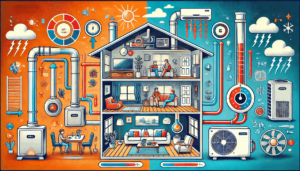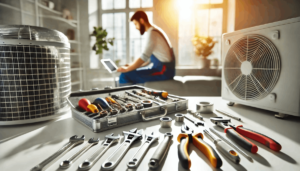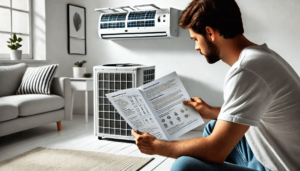Introduction
Air conditioning systems are essential for maintaining comfort during Ontario’s hot summers, but like any mechanical system, they can encounter issues that reduce efficiency and reliability. While some AC problems are minor, others can lead to significant repairs if left unattended. Understanding the most common AC repair issues in Ontario and how to prevent them can save homeowners time, money, and the inconvenience of an unexpected system breakdown.
In this article, we’ll explore frequent AC problems specific to Ontario’s climate, such as refrigerant leaks, frozen evaporator coils, and electrical control failures. We’ll also offer tips on preventing these issues through regular maintenance and professional care, ensuring your AC system operates smoothly all year round.
Overview of Common AC Problems in Ontario
As the summer heat ramps up in Ontario, your air conditioner becomes a crucial part of maintaining comfort in your home. However, like any mechanical system, air conditioners are prone to issues that can affect their performance. These common problems often lead to the need for professional AC repair, especially when not addressed promptly. Understanding these issues and their underlying causes can help you identify when your system needs attention and potentially avoid costly repairs in the future. Here’s a look at some of the most frequent AC problems homeowners in Ontario face and how they can be prevented.

Frequent Refrigerant Leaks
Refrigerant is the substance that allows your air conditioner to cool the air in your home. It circulates through the system, absorbing heat from inside your home and releasing it outside. When refrigerant levels are low due to a leak, the AC unit loses its cooling efficiency, which can cause the system to malfunction and result in higher energy bills.
Why Refrigerant Leaks Happen
Refrigerant leaks can occur due to a variety of reasons, including:
- Corrosion of coils: Over time, the copper coils that carry the refrigerant can corrode, creating small holes that allow the refrigerant to escape. This is often the result of exposure to contaminants such as moisture, chemicals, or other environmental factors.
- Vibrations and wear: Air conditioners are subject to constant vibrations during operation, which can lead to cracks or loosening of connections in the refrigerant lines. This wear and tear, if unchecked, can cause leaks over time.
- Factory defects or improper installation: In some cases, refrigerant leaks can be traced back to manufacturing defects or improper installation. For example, a poorly soldered joint can weaken under pressure, eventually allowing the refrigerant to escape.
Symptoms of a Refrigerant Leak
A refrigerant leak can significantly affect your air conditioner’s performance, so it’s important to recognize the signs early:
- Reduced cooling efficiency: One of the most noticeable signs of a refrigerant leak is when your AC unit struggles to cool your home. If the refrigerant level is too low, the system will have difficulty absorbing and expelling heat, resulting in insufficient cooling.
- Longer cooling cycles: If your air conditioner is running for extended periods without reaching the desired temperature, it could be due to a lack of refrigerant. The system has to work harder and longer to cool the space, leading to higher energy consumption and increased wear on the unit.
- Hissing or bubbling sounds: A refrigerant leak may produce hissing or bubbling sounds near the indoor or outdoor unit. This noise indicates that refrigerant is escaping from a pressurized area.
- Ice buildup on the evaporator coil: When refrigerant levels are low, the evaporator coil may not absorb enough heat, causing condensation to freeze on the coil. This ice buildup further reduces the system’s ability to cool, leading to even more strain on the AC unit.
Why Refrigerant Leaks Need Immediate Attention
Refrigerant leaks are not only detrimental to your AC system’s efficiency but also harmful to the environment. Most refrigerants used in air conditioners, such as R-22 and R-410A, are potent greenhouse gases that can contribute to ozone depletion and climate change if released into the atmosphere.
Additionally, running your air conditioner with low refrigerant levels can cause severe damage to the system, particularly to the compressor, which is one of the most expensive components to replace. Addressing refrigerant leaks promptly ensures that your system remains energy-efficient and prevents more costly repairs down the road.
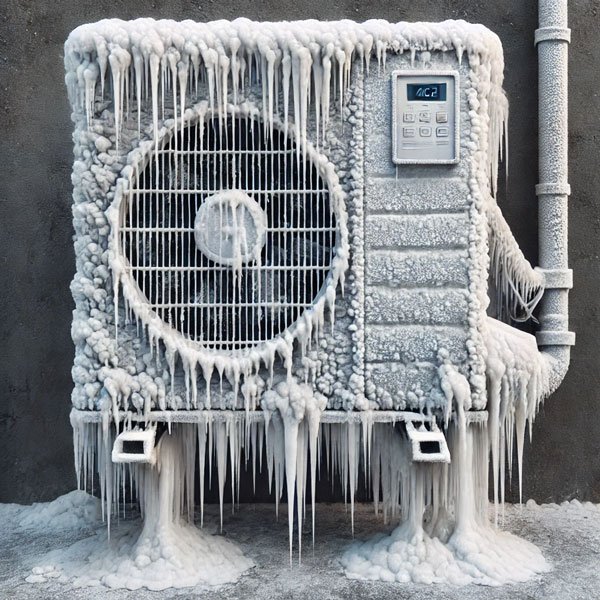
Frozen Evaporator Coils
Frozen evaporator coils are another frequent issue that can disrupt your AC system’s functionality. The evaporator coil is responsible for absorbing heat from the indoor air, but when it becomes frozen, the system cannot effectively cool your home.
What Causes Frozen Evaporator Coils?
There are several reasons why evaporator coils freeze. One of the most common causes is restricted airflow, which can result from dirty air filters, blocked air ducts, or a malfunctioning blower fan. If warm air is not flowing properly over the coils, the refrigerant inside the coils gets too cold, causing condensation to freeze on the coils.
Low refrigerant levels, often due to leaks, can also cause the coils to freeze. When there’s not enough refrigerant, the pressure in the evaporator coil drops, causing the temperature to fall below freezing.
Signs of Frozen Coils
- A noticeable decrease in cooling performance.
- Water leaking around the indoor unit as the ice melts.
- Frost or ice visible on the evaporator coil or refrigerant lines.
- Airflow that feels weak or nonexistent.
Preventing Frozen Coils
To prevent evaporator coils from freezing, ensure that the air filters are replaced regularly and that your ducts are clear of blockages. It’s also essential to schedule routine maintenance, where a technician can inspect and clean the coils and check for any airflow issues. Regular cleaning of the evaporator coil itself helps ensure that it can absorb heat effectively. If you notice any signs of ice buildup, turning off the system and calling a professional for AC repair can prevent further damage.
Clogged Drainage Lines
Your air conditioner doesn’t just cool the air; it also removes excess humidity from your home. This moisture is collected in the system’s drain pan and then funneled out through a drainage line. Over time, this drainage line can become clogged with dirt, dust, algae, or mold, leading to water backup and potential system failure.
Causes of Clogged Drainage Lines
Clogged drainage lines are often the result of neglect. When the AC operates, it produces condensation, which flows out through the drain line. If the line isn’t maintained or cleaned regularly, debris like dust, dirt, and algae can accumulate, eventually causing a blockage. In Ontario, where summer humidity levels can be high, clogged drain lines are particularly common, as the AC must work harder to remove moisture from the air.
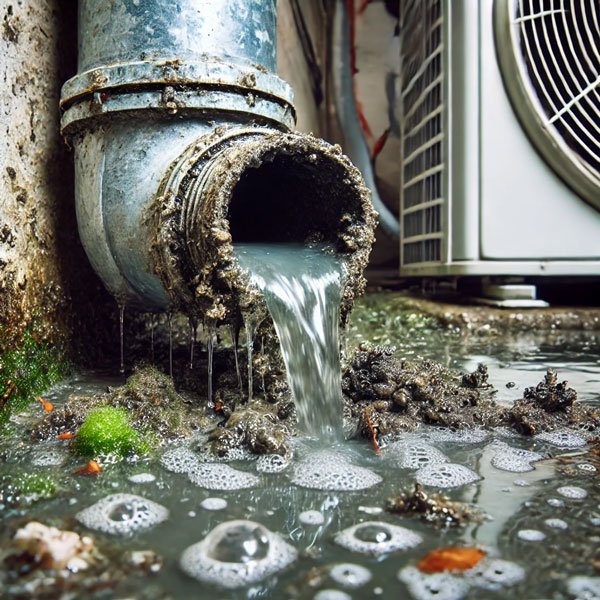
Signs of a Clogged Drainage Line
- Water pooling around the indoor AC unit.
- A musty or moldy smell coming from the vents.
- Increased indoor humidity levels.
- The AC system shutting down due to water backup.
Preventing Clogged Drainage Lines
Regular maintenance is key to preventing clogs in the drainage lines. HVAC professionals can clear the lines during routine inspections to ensure that they’re free of debris. Installing a float switch in the drain pan can also help by automatically shutting off the system if the water level gets too high, preventing overflow. Homeowners can also help prevent clogs by keeping the area around the indoor unit clean and free of dust.
Electrical Control Failures
Electrical issues are a leading cause of AC repair requests, and they can range from minor component failures to complete system shutdowns. Electrical control failures often occur due to frequent cycling on and off, which wears down the components responsible for running the fan and compressor.
Causes of Electrical Control Failures
Ontario homeowners often experience electrical problems in their air conditioners due to power surges, frequent cycling during peak summer usage, and general wear and tear. If the AC is too large for the home or frequently cycles on and off, it puts additional strain on the electrical controls, such as the fan motor or compressor. Additionally, faulty wiring or corrosion on electrical contacts can lead to system malfunctions.
Symptoms of Electrical Control Failures
- The AC fails to turn on or suddenly shuts off.
- The fan or compressor doesn’t respond, even when the system is running.
- Unusual noises coming from the unit, such as buzzing or clicking sounds.
- The system struggles to maintain a consistent temperature.
Preventing Electrical Failures
To avoid electrical control failures, it’s important to schedule regular inspections of your air conditioner, particularly before the peak summer season. HVAC professionals can test the system’s electrical components and identify any potential issues early on. It’s also recommended to install surge protectors to guard your AC unit against power surges. If you notice signs of electrical issues, like the system struggling to turn on or unexpected shutdowns, call for AC repair immediately to prevent further damage.
Seasonal Challenges Ontario Homeowners Face with AC Systems
Ontario’s unique climate poses several challenges for homeowners when it comes to maintaining their air conditioning (AC) systems. The hot, humid summers, paired with fluctuating temperatures, often cause stress on AC units, leading to performance issues and the need for AC repair. Understanding how these seasonal factors affect your cooling system can help you take proactive measures to ensure it runs efficiently throughout the year. Below, we’ll explore some of the most common seasonal challenges Ontario homeowners face and how they impact AC performance.
Impact of Humidity on AC Performance
Ontario experiences high humidity levels during the summer, which can significantly affect the performance of your air conditioner. High humidity makes the air feel hotter than it is, which means your AC unit has to work harder to cool your home and remove excess moisture from the air.
How Humidity Affects Your AC System
Air conditioners do more than just cool the air in your home—they also dehumidify it. When the humidity levels are high, your AC must work overtime to reduce the moisture content in the air. This additional workload can cause your AC to run for longer periods, which increases wear and tear on components like the compressor and evaporator coils.
When humidity is excessive, the system may struggle to maintain a comfortable temperature, even though it’s running continuously. This can lead to issues such as:
- Decreased cooling efficiency: The more humid the air, the harder it is for your AC to cool the space, leading to uneven or insufficient cooling.
- Increased energy consumption: Since the AC has to run longer to achieve the desired temperature, it consumes more electricity, leading to higher utility bills.
- Moisture-related damage: High humidity can also cause moisture buildup in your AC unit, leading to mold growth and clogged drain lines.
Preventing Humidity-Related Issues
To prevent issues caused by humidity, consider the following tips:
- Install a dehumidifier: Pairing your AC with a whole-home dehumidifier can help reduce the workload on your air conditioner by removing excess moisture before it reaches the system.
- Regular maintenance: Schedule regular AC maintenance to ensure that your unit is functioning efficiently. A professional technician can check for refrigerant leaks, clean evaporator coils, and inspect the system for moisture buildup.
- Use a programmable thermostat: Adjusting the temperature settings based on the humidity levels in your home can help reduce strain on your AC system.
Overworking AC Units in Ontario Summers
Ontario summers can be scorching, with temperatures often climbing above 30°C (86°F). When the heat is intense, homeowners tend to rely heavily on their AC systems to maintain a cool indoor environment. However, overworking the AC during these peak summer months can lead to several problems that may require professional AC repair.
How Hot Summers Overwork Your AC
When the temperatures soar, your AC system runs longer and more frequently to cool your home. This constant operation puts a significant strain on critical components like the compressor, condenser coils, and fan motor. Over time, these components can wear out, leading to reduced efficiency and frequent breakdowns.
Some of the common issues associated with overworking your AC include:
- Compressor failure: The compressor is one of the most critical (and expensive) parts of your AC system. When it’s forced to work nonstop during extreme heat, it can overheat or break down, leading to costly repairs or even a full replacement.
- Refrigerant leaks: Overworking the system can cause refrigerant leaks, which result in decreased cooling efficiency and higher energy bills.
- Electrical issues: Excessive use of the AC can cause electrical components to overheat, leading to failures in the system’s wiring, capacitors, or circuit boards.
Preventing Overworking During Hot Summers
To avoid overworking your AC unit during Ontario’s hot summers, you can take several preventive measures:
- Perform regular maintenance: Ensuring that your AC unit is in optimal condition before the summer season begins can help prevent it from overworking. This includes cleaning the coils, checking refrigerant levels, and inspecting the fan motor.
- Upgrade your insulation: Proper insulation in your home can help maintain cooler temperatures and reduce the need for constant AC usage. Insulated windows, doors, and attic spaces can all contribute to better temperature regulation.
- Use ceiling fans: Ceiling fans can help circulate cool air throughout your home, allowing you to set your AC thermostat at a slightly higher temperature without sacrificing comfort.
- Schedule AC tune-ups: Regular tune-ups by an HVAC professional will ensure your AC is ready to handle the heat without breaking down.
Problems Caused by Fluctuating Temperatures
Ontario’s weather is known for its sudden temperature fluctuations, especially during transitional seasons like spring and fall. These changes in temperature can take a toll on your AC system, causing it to cycle on and off more frequently, which can lead to wear and tear on key components.
How Temperature Fluctuations Affect AC Performance
When temperatures fluctuate between hot and cool, your AC system may cycle on and off more often to maintain a consistent indoor temperature. This frequent cycling can lead to the following problems:
- Short cycling: Short cycling occurs when the AC system turns on and off in rapid succession, preventing it from completing a full cooling cycle. This not only reduces the unit’s efficiency but also increases wear and tear on the compressor and other components.
- Thermostat malfunctions: Temperature fluctuations can cause your thermostat to malfunction, leading to inaccurate temperature readings and poor system performance. Inaccurate readings may cause the AC to turn on when it’s not needed or stay off when it should be cooling the home.
- Increased energy consumption: Frequent cycling forces the AC system to work harder, which results in higher energy consumption and, ultimately, increased utility bills.
Preventing Issues from Temperature Fluctuations
Here are some ways to prevent problems caused by fluctuating temperatures:
- Install a smart thermostat: Smart thermostats can adapt to temperature fluctuations and make automatic adjustments to your cooling system, ensuring it only runs when necessary. These devices can also be programmed to follow a schedule, further reducing unnecessary usage.
- Maintain proper insulation: Good insulation helps maintain indoor temperatures despite fluctuations in outdoor weather. Properly insulated homes experience less strain on their AC systems, as they require less frequent cooling adjustments.
- Ensure proper ventilation: Proper airflow and ventilation are critical to preventing temperature-related issues. A well-ventilated home allows your AC system to distribute cool air more evenly, reducing the need for frequent cycling.
How Professional AC Maintenance Prevents Costly Repairs
Regular maintenance is key to ensuring the longevity and efficiency of your air conditioning system. Homeowners who invest in routine care for their AC units can avoid expensive repairs down the line and keep their systems operating smoothly, especially during the hottest months. For those seeking AC repair services, understanding the value of professional maintenance is essential. Not only does maintenance improve performance, but it also helps identify potential issues before they escalate into costly problems. In this section, we’ll explore how routine AC maintenance practices, such as filter replacements, cleaning, and annual tune-ups, can prevent costly repairs.
Regular Filter Replacements
Air filters play a crucial role in the overall efficiency of your air conditioning system. They trap dust, dirt, and other airborne particles, preventing them from entering the system and clogging its components. However, when these filters become dirty or clogged, they restrict airflow, causing the system to work harder than necessary. This increased strain can lead to a variety of problems, including overheating, reduced cooling efficiency, and even system failure.
Why Regular Filter Replacement Is Important
- Enhanced efficiency: Clean air filters allow your AC system to operate at peak efficiency. When airflow is unrestricted, the system doesn’t have to work as hard to cool your home, which can reduce wear and tear on key components.
- Improved indoor air quality: Dirty air filters can’t effectively trap dust, pollen, and other allergens, leading to poor indoor air quality. Regular filter replacements ensure that these particles are removed, keeping the air in your home clean and healthy.
- Reduced risk of breakdowns: A clogged filter puts excessive strain on the AC’s blower motor, which can lead to overheating and eventual failure. By replacing filters regularly, you reduce the risk of costly breakdowns.
How Often Should You Replace Filters?
The frequency of filter replacement depends on several factors, including the type of filter used, how often the AC runs, and the environment in which it operates. In general:
- Standard 1-3 inch filters should be replaced every 30-60 days.
- High-efficiency filters (such as HEPA filters) can last 6-12 months but should still be checked regularly.
- If you have pets, live in a high-dust area, or suffer from allergies, more frequent filter changes may be necessary.
Preventing AC Repairs with Regular Filter Changes
By ensuring that your air filters are replaced regularly, you can prevent common issues like overheating, poor airflow, and system breakdowns. Homeowners who neglect filter replacement often face AC repair costs that could have been easily avoided with this simple maintenance task.
Routine Cleaning of Coils and Fans
The coils and fans within your AC system are vital for efficient heat transfer and proper airflow. When dirt and debris accumulate on these components, they can’t function as intended, leading to reduced cooling capacity and higher energy bills. Regular cleaning of both the evaporator and condenser coils, as well as the fans, helps maintain the system’s efficiency and prevents more serious issues from developing.
Why Coil and Fan Cleaning Is Essential
- Evaporator coils: These coils are located inside the indoor unit and are responsible for absorbing heat from your home’s air. When they become covered in dust or dirt, they can’t effectively absorb heat, causing the AC to run longer and work harder to cool your home. This not only reduces efficiency but also increases wear and tear on the system.
- Condenser coils: The condenser coils, located in the outdoor unit, release the heat absorbed by the evaporator coils into the outside air. If these coils are dirty, they can’t efficiently transfer heat, causing the system to overheat and potentially shut down.
- Fan blades: The fans circulate air over the coils, facilitating heat exchange. When the blades become dirty or unbalanced, they can’t move air effectively, reducing overall system performance and leading to potential motor damage.
How Often Should Coils and Fans Be Cleaned?
- Evaporator coils should be cleaned at least once a year during regular maintenance. However, if the unit is located in a dusty or high-pollen environment, more frequent cleaning may be required.
- Condenser coils should be cleaned once or twice a year, especially before the start of the cooling season. Leaves, dirt, and other debris can accumulate around the outdoor unit, so keeping the area clear can also help maintain coil cleanliness.
- Fan blades should be inspected and cleaned during each maintenance visit to ensure they are free of debris and balanced correctly.
Preventing AC Repairs with Coil and Fan Cleaning
Regular cleaning of coils and fans can prevent overheating, reduced airflow, and even complete system failure. Dirty components force the AC to work harder, increasing energy consumption and the likelihood of breakdowns. Routine cleaning is one of the most effective ways to maintain system performance and avoid costly AC repair services.
Annual Tune-Ups by Certified Technicians
While replacing filters and cleaning coils are important, a full system tune-up by a certified HVAC technician is essential for preventing more serious issues. During an annual tune-up, a professional will thoroughly inspect, clean, and test your air conditioning system to ensure it’s operating at peak efficiency. This preventive maintenance service helps identify potential problems early, allowing for repairs before they turn into expensive breakdowns.
What Happens During an Annual Tune-Up?
An annual AC tune-up typically includes the following tasks:
- Inspection of refrigerant levels: Low refrigerant levels can cause the system to run inefficiently and even lead to compressor failure. Technicians will check for leaks and ensure the refrigerant is at the proper level.
- Testing of electrical components: Loose or corroded electrical connections can lead to malfunctions or short circuits. Technicians will test all electrical components, including capacitors, relays, and circuit boards, to ensure they’re in good working order.
- Lubrication of moving parts: Motors, fans, and other moving parts need to be lubricated to reduce friction and prevent overheating. Technicians will apply lubricant to these components during the tune-up.
- Thermostat calibration: An improperly calibrated thermostat can cause the AC to run longer than necessary or shut off too soon. Technicians will check and adjust the thermostat to ensure accurate temperature control.
- Checking and cleaning condensate drain lines: Clogged drain lines can lead to water damage and mold growth. Technicians will clear the lines and ensure proper drainage.
Why Professional Tune-Ups Are Important
Professional tune-ups offer several benefits:
- Enhanced system efficiency: A well-maintained AC system uses less energy, resulting in lower utility bills and reduced wear on the system’s components.
- Improved reliability: Annual tune-ups help catch potential problems early, preventing unexpected breakdowns during peak cooling seasons.
- Extended lifespan: Regular maintenance extends the life of your air conditioner by reducing the stress on critical components and preventing major failures.
Preventing AC Repairs with Annual Tune-Ups
An annual tune-up is one of the best investments you can make to prevent costly AC repairs. By catching small issues early, such as refrigerant leaks or electrical problems, you can avoid larger, more expensive repairs in the future. Certified technicians have the knowledge and tools needed to ensure your system runs smoothly and efficiently year after year.
When to Call for AC Repair in Ontario
Living in Ontario, especially during the hot summer months, means that a fully functional air conditioning system is essential for maintaining home comfort. However, many homeowners may overlook the early signs of trouble, which can lead to costly repairs down the road. Knowing when to call for AC repair can help you avoid these expenses, ensuring your unit operates efficiently and provides the necessary cooling when you need it the most.
In this section, we’ll discuss some common indicators that your air conditioner may need professional attention. Whether it’s unusual noises, inconsistent cooling, or unexplained increases in your energy bills, paying attention to these signs can save you time, money, and frustration.
Unusual Noises Coming from the Unit
One of the most obvious signs that your AC system may require repairs is when it starts making strange or unusual noises. Most air conditioners operate relatively quietly, with only a slight hum during operation. However, if you notice new or disruptive sounds, it’s a clear indicator that something is wrong.
Common Noises and What They Mean
- Grinding or screeching: These sounds could indicate that there is an issue with the motor’s bearings or the fan. Over time, these components can wear out, causing friction that leads to grinding noises. This issue needs immediate attention, as it could result in complete motor failure if left unchecked.
- Banging or clanking: A banging or clanking noise often signals that a component inside the unit, such as the fan blade or compressor, is loose or broken. If the fan becomes unbalanced or the compressor starts to malfunction, it can cause serious internal damage to the system.
- Hissing or whistling: These sounds typically suggest a refrigerant leak or an issue with the ductwork. A refrigerant leak can not only reduce the unit’s efficiency but also pose health risks if the refrigerant escapes into your home. Hissing could also be caused by duct leaks, which reduce the efficiency of your cooling system by allowing cool air to escape.
- Buzzing: A buzzing sound could indicate an electrical issue within the AC unit, such as faulty wiring or a malfunctioning capacitor. This problem requires immediate professional attention, as electrical issues can be dangerous and may cause further damage to your system.
Why You Shouldn’t Ignore Unusual Noises
Ignoring strange sounds coming from your air conditioner can lead to bigger problems. Small issues, like loose components, can quickly escalate into major repairs if they’re not addressed promptly. Additionally, unusual noises often indicate that your system is under stress, which could cause it to work harder and wear out faster, ultimately shortening the lifespan of the unit. Calling for AC repair as soon as you hear unusual noises can prevent further damage and extend the life of your system.
Inconsistent Cooling or Airflow
Another common sign that your air conditioner may need repairs is inconsistent cooling or airflow throughout your home. If certain rooms are cooler than others or your AC struggles to maintain a steady temperature, it’s likely that something is wrong with the system.
Potential Causes of Inconsistent Cooling
- Clogged air filters: A clogged or dirty air filter can restrict airflow, making it difficult for your AC to cool your home evenly. Regularly changing the air filter is a simple but essential step in maintaining proper airflow and preventing overworking the system.
- Blocked or leaky ducts: If the ductwork in your home is blocked or leaking, the cool air generated by your AC may not reach certain rooms, leading to inconsistent temperatures. Leaks in the duct system can also cause your AC to lose efficiency, as cooled air escapes before it reaches its intended destination.
- Refrigerant issues: Low refrigerant levels can also lead to inconsistent cooling. If your AC system is low on refrigerant, it won’t be able to absorb and release heat effectively, resulting in inadequate cooling in some parts of your home.
- Thermostat problems: A malfunctioning thermostat can cause your AC to deliver uneven cooling. If the thermostat isn’t accurately reading the temperature or isn’t communicating properly with the AC unit, it can cause the system to cycle on and off incorrectly, leading to uneven cooling.
Why Inconsistent Cooling Needs Immediate Attention
If you notice that your AC isn’t cooling your home consistently, it’s important to schedule a repair service as soon as possible. Inconsistent cooling not only affects your comfort but can also indicate more serious underlying issues with the system, such as a refrigerant leak or malfunctioning components. Addressing these issues promptly can prevent them from worsening and help maintain the efficiency of your AC system.
Rising Energy Bills Without Increased Usage
If you notice a sudden spike in your energy bills without a corresponding increase in your AC usage, it could be a sign that your system is no longer operating efficiently. When an air conditioning system experiences mechanical problems or component failures, it has to work harder to maintain the desired temperature, leading to higher energy consumption.
Common Causes of Rising Energy Bills
- Dirty or clogged components: Dirt and debris can accumulate on various parts of the AC system, such as the coils and filters, reducing its efficiency. When these components are clogged, the system has to work harder to cool your home, using more energy in the process.
- Worn-out parts: As your AC system ages, its components may begin to wear out and become less efficient. For example, a compressor that is nearing the end of its life may consume more energy to perform the same task, leading to higher utility bills.
- Refrigerant leaks: A refrigerant leak can cause your AC to lose its cooling capacity, forcing it to run longer cycles and consume more energy. If you suspect a refrigerant leak, it’s important to have it repaired quickly, as running the system without adequate refrigerant can damage the compressor.
- Lack of regular maintenance: Without regular maintenance, your AC system may become inefficient over time. Components can become dirty, belts can wear out, and refrigerant levels can drop. All of these issues contribute to an increase in energy consumption, as the system works harder to cool your home.
How Rising Energy Bills Signal the Need for AC Repair
If your energy bills have risen unexpectedly, it’s essential to investigate the cause and consider scheduling a professional AC repair service. An inefficient AC system not only costs you more in energy bills but also puts additional strain on the system, which can lead to more frequent breakdowns and costly repairs in the future. A professional technician can diagnose the issue, clean or replace worn-out components, and restore the system’s efficiency.
Conclusion
In Ontario, air conditioning systems are vital for keeping homes comfortable during the warmer months. However, issues like refrigerant leaks, frozen evaporator coils, clogged drainage lines, and electrical failures can disrupt this comfort if not addressed early. Understanding these common AC problems and taking proactive steps through regular maintenance and timely repairs can significantly reduce the risk of breakdowns.
By scheduling annual inspections, replacing filters regularly, and staying aware of early warning signs, homeowners can prevent costly repairs and extend the lifespan of their AC units. Investing in professional maintenance not only ensures efficient performance but also provides peace of mind, knowing that your system will function reliably when you need it the most.
Resources
- U.S. Department of Energy: Common Air Conditioner Problems
- Ontario HVAC Association: Maintaining Your HVAC System
- HVAC.com: How to Prevent AC Problems
- U.S. Department of Energy: Understanding Humidity’s Impact on AC
- HVAC.com: How Hot Summers Affect Your AC
- U.S. Department of Energy: Air Conditioning Maintenance Tips
- HVAC.com: Benefits of Regular AC Maintenance
- U.S. Department of Energy: Energy Saver Tips
- HVAC.com: Common AC Problems and How to Fix Them
- Ontario HVAC Association: When to Call for AC Repair
- Ontario HVAC Association: Importance of Annual HVAC Tune-Ups
- Ontario HVAC Association: Tips for Maintaining AC Efficiency in Hot Weather
- HVAC.com: Common Air Conditioning Problems
- Energy Star: Air Conditioner Maintenance Tips
- Ontario HVAC Association: Preventing AC Failures


